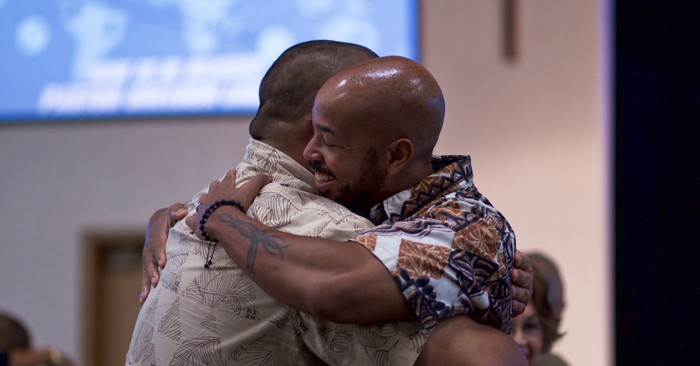
According to a broad range of men’s ministry experts, including men who have led transformative men’s ministries for years, you need to take a strategic approach, and your strategy needs to include six elements. Here they are.
You understand the value of having the men of your church thrive.
You want your church to have an effective, sustainable men’s ministry.
You know that building such a ministry is going to take a big effort. And you already feel stretched in 15 different directions. So, what should you do?
According to a broad range of men’s ministry experts, including men who have led transformative men’s ministries for years, you need to take a strategic approach, and your strategy needs to include six elements. Here they are.
1. Commit to being “all in” for your men.
The foundation of your strategy needs to be a realization that you are not building a ministry. You are building men.
That takes time. It takes commitment. And it requires visible support from every pastor, especially the senior pastor.
“Men need to know that they matter,” says Jeff Springer of Suit Up Ministries, who served as the Minister of Men for 16 years at a United Methodist Church in Texas. During Sunday morning worship, he continues, the pastor must tell the men that they are important to their wives, their families, their friends and coworkers, their church . . . and their pastor.
Men want to connect to their pastor, adds Rick Wertz of Faithful Fathering. He encourages pastors to engage one-on-one with their men and “be real” with them at every opportunity.
Getting to know your pastor is great. What’s more important to a man, however, is understanding that his pastor and his church are committed to investing in him, not just for a short time but for the long haul.
After all, the mission of the church is to make disciples, and making disciples is a strategic venture.
2. Build a team of men to lead your men.
While pastors need to demonstrate visible support for men’s ministry, they don’t need to lead every aspect of a men’s ministry. Most churches with successful men’s ministries have a team leadership approach.
Brett Clemmer, president of Man in the Mirror, recommends that a pastor builds a leadership team made up of men who are passionate about men’s discipleship. Wertz suggests that the members of that team reflect the demographics of the men in the church.
Springer suggests that the leader of that team be someone on staff, to make it clear that the church is investing in its men and to prevent disruption if a lay leader gets burned out or moves away. He adds that the leader has to be passionate about seeing the men of the church grow in Christ and must relate well to other men.
Finding a staff person with the necessary skills, passion, and bandwidth is tough in most churches, say Wertz and Clemmer. They argue that the best choice is a passionate layman who has the support and encouragement of the pastor or pastoral team.
Continuity on the men’s leadership team from year to year is good. But so is change in the makeup of the team, especially when the new leaders are men who have been discipled in the church and now are eager to disciple others.
3. Get to know your church’s men.
There is no cookie-cutter approach to effective men’s ministry. Your men’s ministry must meet the needs of the men in your church. To understand those needs, your leadership team must get to know the men of your church at a deep level.
That can be a challenge because many men are reluctant to reveal much about themselves. “Ask a man how he’s doing, and he’ll tell you he’s fine,” says David Dusek, founder of Rough Cut Men. “He’s not fine. He’s got issues. But he doesn’t have anyone to talk to about them because he doesn’t trust anybody.”
To build friendships, and trust, with the men of your church, your leadership team must engage with them outside of Sunday morning and outside of the typical men’s events. Real connections are forged in the real world, with its day-to-day challenges and issues.
It will take time for the typical man to begin to open up about what’s really happening in his life. And you must ensure that your conversation is surrounded by complete confidentiality.
“When you sit down with other guys, they have to feel that you’re in a spiritual Humvee,” he says. “The windows are bulletproof. It's soundproofed so you can have an authentic conversation.”
Confidentiality, adds Craig Fry of Christ Led Communities, needs to be in place at every men’s event, function, and meeting. Men need assurance that every group is a closed group where they can have deep conversations. “If guys are not confident that stuff will stay in the room, they are not going to open up,” he says. “They will stay on the surface, and on the sidelines.”

Photo Credit: ©GettyImages/digitalskillet
4. Focus on critical issues facing your men.
Men are busy. They have many responsibilities and carry many burdens. If a ministry, even one designed for them, doesn’t make a significant difference in their lives, then men won’t stay with it.
One way to make your men’s ministry relevant to your men is to focus on the most relevant issues faced by your men. But a 24-year-old single guy is likely to face different issues than a 55-year-old man with two adult children and two teenaged stepkids. On which issues should your men’s ministry focus?
Springer argues that fatherhood should be one of them. “I don't believe that you can have a comprehensive men’s ministry without focusing on fatherhood,” he says. Even if a man is not a father right now, Springer continues, he will be a father, or father figure, at some point in his life.
Wertz agrees. Fatherhood is relevant to every man, he says, because every man is a son of an earthly father and a heavenly Father. When acting in the role of a father or father figure, most men pay too much attention to their own earthly father – either emulating him or trying to do the opposite of what he did – and not enough time studying and understanding how their heavenly Father operates.
In addition to establishing a biblical model for fatherhood, a men’s ministry can provide opportunities for more “seasoned” men to act spiritual fathers to younger men, says Wertz. Some churches schedule regular dinner nights for men, where roundtable discussions with younger and older men occur. Older men don’t need to have all the answers, but they certainly have experiences from which younger men can learn.
Be sure not to ignore other issues raised by the men of your church during your conversations with them. If an issue is important to only a handful of your men, then look for opportunities to get those men together. A few minutes after a bigger men’s event is not enough; give those men enough time not only to grapple with the issue but also to get to know each other.
5. Choose approaches that help men develop strong friendships.
Men crave authentic connections with other men, but such connections are getting rarer. According to a 2021 survey of U.S. adults, the typical man has only a handful of close friends; nearly one in six has none. When a man struggles with sin or feels like a failure in some part of his life, he is unlikely to confide in the few male friends that he has.
Those who lead Christian men need to prioritize a commitment to building deep and lasting friendships among those men, says former NFL quarterback Jeff Kemp, who has spent the last two decades strengthening marriages and families with organizations such as FamilyLife. Jesus spent three years building strong friendships with his disciples, Kemp continues, and that close-knit group changed the world.
“We need to recover and revive the types of friendships that Jesus intends us to have,” adds Kemp.
Clemmer agrees that strong friendships between men are key. “If you want to sustain life change in your men, you need to connect them into meaningful relationships with other men,” he says.
6. Set strategic goals and formulate a plan to achieve them.
A pastor may consider discipleship to be the right strategic goal for his church’s men’s ministry. Fry argues that discipleship does not go deep enough.
The right goal, he says, is to make disciple-makers. When that is your goal, your approach should center on a small group of men who meet regularly for an extended period of time, probably several years. Those men will lead the effort to make the next round of disciple-makers.
It’s what Fry calls a “deep” approach, adding that Jesus modeled this approach 2,000 years ago. The alternative is a “wide” approach, where a church offers events of interest to many men and then encourages each man to find an affinity group among a subset of attendees.
Clemmer asserts that a church doesn’t have to choose between going wide and going deep but can do both. When you assess your men, you can determine where each is spiritually and shape your ministry elements around the needs of your men. The goal, he says, is to build a process that gives every man a discipleship pathway towards spiritual maturity.
Photo Credit: Erika Giraud/Unsplash








